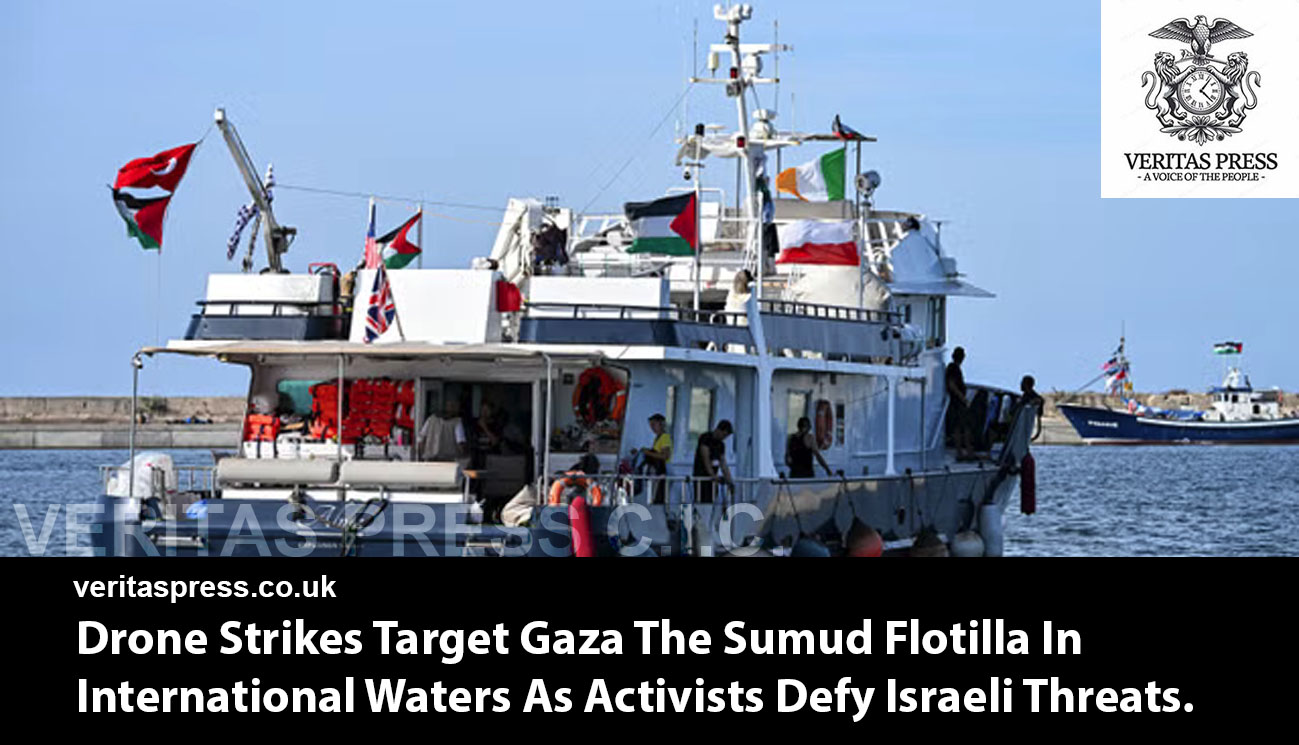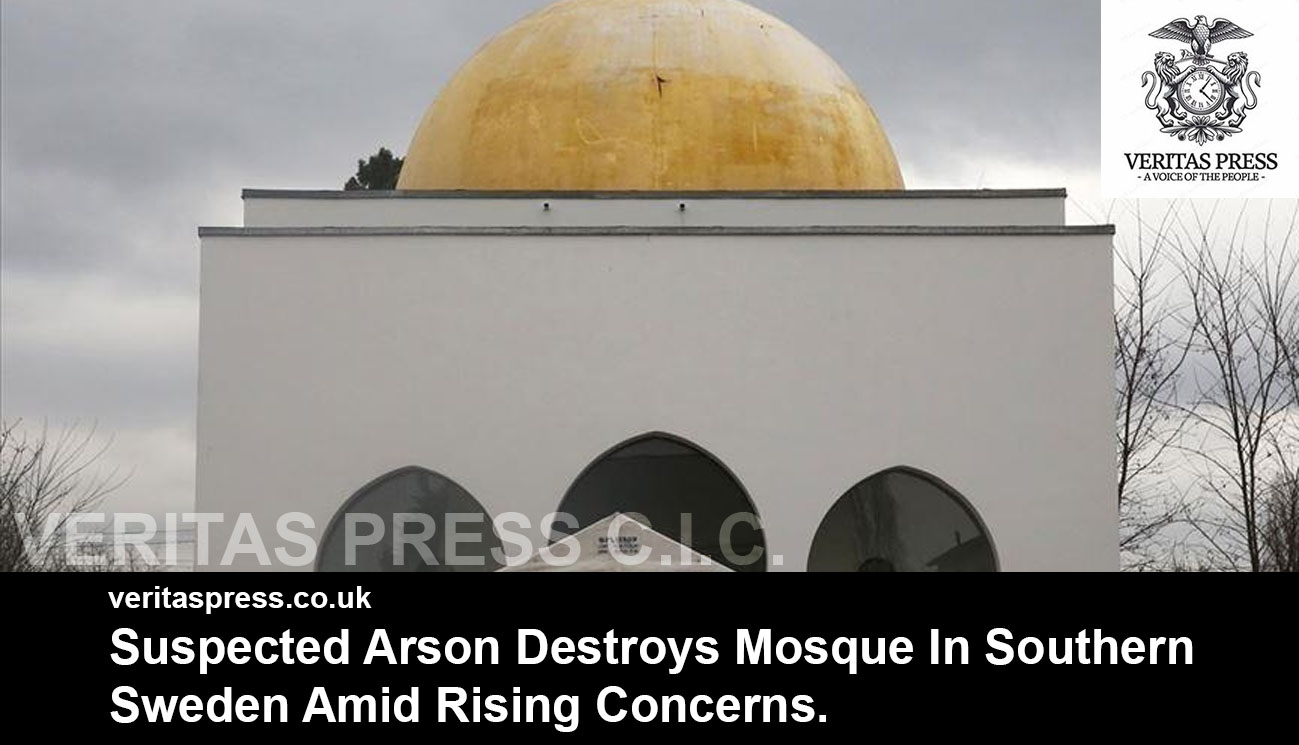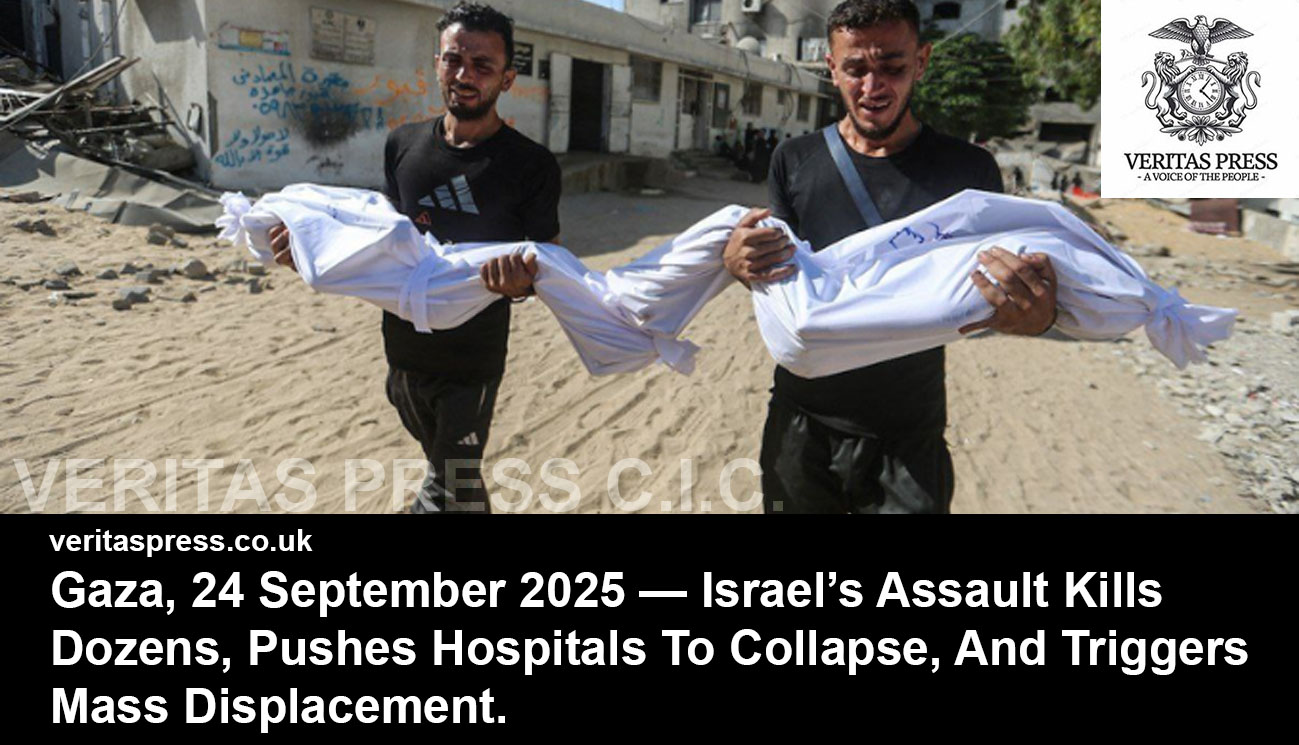The Global Sumud Flotilla, a coalition of aid ships carrying food and medicine to Gaza, came under a series of drone attacks overnight in the Mediterranean Sea, organisers and eyewitnesses said. Activists aboard the vessels off Greece reported hearing explosions and seeing multiple drones strike from late Tuesday into early Wednesday.
At least 10 vessels were targeted in international waters, with activists reporting explosions, attempted mast destruction, and the release of chemical-smelling substances from aerial drones. Witnesses also said communications were hacked, with radios suddenly blasting music in what flotilla organisers described as a psychological warfare tactic.
“Israel has carried out multiple drone strikes on the Freedom Flotilla in international waters,” organisers said in a statement. “We are facing direct, illegal military aggression.”
UN Special Rapporteur on the Occupied Palestinian Territories Francesca Albanese confirmed reports of seven drone strikes, urging governments to demand an immediate halt and provide international protection for the flotilla.
High-Profile Participation:
Environmental activist Greta Thunberg is among the high-profile participants, lending global visibility to the mission. “The people of Gaza are being starved in full view of the world,” she said before boarding in Barcelona. “We cannot stay silent while entire populations are denied food, water, and freedom.”
She is joined by parliamentarians from Europe and Latin America, including members of Spain’s Unidas Podemos and Ireland’s Sinn Féin, who argue that political institutions have failed to stop the siege. “If governments won’t act, then we as citizens must,” said Irish MP Claire Daly, speaking from the deck of one of the vessels.
International lawyers specialising in humanitarian and maritime law are also on board, framing the voyage as a legal challenge to Israel’s blockade. “This is a test of international law in practice,” said Spanish jurist María Pérez. “A naval blockade that starves civilians is not just immoral, it is unlawful.”
Several well-known aid workers and campaigners from Africa, Asia, and North America have also joined. Among them are doctors who previously volunteered in Gaza, union representatives, and clergy members from Christian and Muslim organisations.
International activists say they organised the flotilla as a peaceful action to draw global attention to Gaza’s humanitarian crisis and the deadly consequences of Israel’s naval blockade.
Israel blocked two earlier attempts by activists to reach Gaza by sea in June and July.
Israel Dismisses Mission As “Provocation”:
The Israeli Foreign Ministry denounced the flotilla, accusing its organisers of seeking confrontation “on behalf of Hamas.” Officials reiterated that Gaza remains an “active combat zone” and warned that any attempt to breach the naval blockade would be stopped.
“Israel is at war with Hamas,” said Rear Admiral Daniel Hagari, an Israeli military spokesperson. “No foreign vessels will be allowed to enter Gaza’s waters, the flotilla is not humanitarian but a provocation designed to assist a terrorist organisation.”
The ministry also urged the flotilla to unload aid at Ashkelon port, promising to transfer supplies through “coordinated and peaceful” channels. “If the organisers reject this, they are exposing their true political motives,” an Israeli diplomatic source told Haaretz.
Pro-government analysts echoed that line. Writing in the Jerusalem Post, former national security adviser Yaakov Amidror argued: “These activists are not neutral humanitarians. They are part of a long-running campaign to delegitimise Israel under the cover of aid.”
Flotilla organisers dismissed the claims as disinformation. Brazilian organiser Tiago Ávila said: “We can never believe an occupying force committing genocide that they will deliver aid, it’s not in their interest.”
Regional And International Reactions:
The drone strikes have drawn alarm across the region and beyond.
- Turkey: President Recep Tayyip Erdoğan condemned the attacks, calling them “an act of piracy in international waters.” He warned Israel that “targeting unarmed civilians delivering food and medicine will have consequences.” Turkish activists are among those on board.
- Egypt: While officially silent, Egyptian media reported unease within Cairo’s government, which fears the incident could ignite further regional instability. Analysts noted that Egypt has already come under pressure for enforcing the blockade at the Rafah crossing.
- European Union: An EU spokesperson said Brussels was “monitoring the situation with concern” but stopped short of condemning Israel directly. Critics called the EU’s statement weak. “European governments cannot preach about human rights while staying silent as aid ships are attacked,” said Italian MEP Manon Aubry.
- United States: Washington reiterated its support for Israel’s “right to self-defence at sea” but urged “all sides to act with restraint.” Activists accused the Biden administration of enabling impunity.
- Arab League: In a joint communiqué, member states denounced the attacks as “a war crime against civilians in international waters” and urged the UN Security Council to act immediately.
Human rights organisations have also sounded alarms. Amnesty International described the attacks as a “clear violation of international maritime law,” while Human Rights Watch warned that targeting humanitarian missions could constitute a grave breach of the Geneva Conventions.
Historical Parallels: The Shadow Of The Mavi Marmara.
The latest confrontation has revived memories of the 2010 Mavi Marmara raid, when Israeli commandos stormed a Turkish-led aid flotilla in international waters, killing 10 activists. That incident triggered a diplomatic crisis between Israel and Turkey and drew widespread international condemnation.
Legal experts note that despite inquiries by the UN and international courts, accountability for the Mavi Marmara killings was effectively blocked by political pressure. “The same dynamics are playing out now,” said Middle East analyst Leila Hassan. “Israel is betting that Western governments will look away, just as they did in 2010, even when civilians were killed.”
For activists, the echoes are deliberate. “We are continuing what those before us started,” said Greek organiser Eleni Kotsou. “If Israel’s crimes at sea go unpunished, the only option is to keep coming back.”
Timeline Of Events: From Departure To Drone Strikes.
- Late August 2025 – Departure from Europe
The Global Sumud Flotilla begins assembling. Ships leave Barcelona (Aug 28) and Genoa (Sep 1) before gathering off Tunisia’s coast. Activists call it the largest humanitarian mission of its kind. - September 2–7 – Preparations and Security Delays
Weather conditions, logistical challenges, and reported security threats delay the departure from Tunisia. By Sep 7, the fleet sets sail toward Gaza. - September 8–9 – First Drone Harassment in Tunisia
Flotilla organisers report their ships came under drone surveillance and minor attacks while anchored in Tunisian waters. No casualties or damage reported. - September 15–20 – Escalating Israeli Threats
Israeli officials declare Gaza an “active combat zone”, warning the flotilla will be blocked. The Israeli Foreign Ministry accuses organisers of acting on behalf of Hamas. - September 22 – Israel’s “Offer”
Israel publicly offers to transfer aid via Ashkelon port, insisting the flotilla cannot approach Gaza. Organisers reject the offer, calling it “manipulation by the Zionist regime.” - September 23 – Drones Shadow the Fleet
Activists report persistent drone surveillance in the Mediterranean, with communications interference and threats of further attacks. - Night of September 24–25 – Coordinated Drone Strikes
At least 10 vessels were targeted in international waters near Greece. Witnesses report 13 explosions, drones dropping chemical-smelling substances, and attempts to destroy ship masts. Radios were hacked to broadcast music in a psychological warfare tactic.
UN Special Rapporteur Francesca Albanese confirms seven drone strikes and calls for international protection.
A Tense Standoff Ahead:
The flotilla, still hundreds of miles from Gaza, remains at sea under heavy surveillance. Activists vow to press ahead despite Israeli threats.
“We are unarmed civilians on a humanitarian mission,” said one organiser. “If Israel attacks us, it exposes the blockade for what it is, collective punishment.”
With dozens of parliamentarians, lawyers, doctors, clergy, journalists, and environmentalists, alongside Greta Thunberg, the standoff is rapidly becoming a high-profile test of Israel’s blockade and of the international community’s willingness to defend civilian missions at sea.
Conclusion: Impunity At Sea And The Test of International Law.
The Global Sumud Flotilla’s voyage has become a high-stakes confrontation between unarmed civilians delivering aid and a heavily militarised state enforcing a siege. Activists reported hearing explosions and seeing multiple drone attacks from their boats situated off Greece from late Tuesday to the early hours of Wednesday, underscoring the immediacy and intensity of the threat they face. At least 10 vessels were targeted, with chemical-smelling substances dropped and communications hacked, clear attempts at intimidation and disruption.
These attacks are not isolated incidents but part of a systematic strategy by Israel to enforce its blockade of Gaza, one of the most heavily restricted territories in the world. The repeated targeting of unarmed civilian vessels, including doctors, parliamentarians, and internationally recognised activists, raises urgent questions about state-sanctioned violations of international maritime law and human rights norms.
Legal experts warn that deliberately interfering with humanitarian aid, harassing civilians in international waters, and employing drones to sow fear constitutes a war crime under the Geneva Conventions. Yet, as seen after the 2010 Mavi Marmara raid, political expediency and Western complicity have historically shielded perpetrators from accountability. Today, Israel appears to be counting on the same international acquiescence, while the blockade has intensified famine, prevented medicine from reaching hospitals, and left over two million Palestinians at the mercy of starvation.
The flotilla’s high-profile composition, including environmental activists like Greta Thunberg, parliamentarians, lawyers, and clergy, is a direct challenge to this impunity, forcing the world to confront not only the legality of Israel’s naval actions but also the moral bankruptcy of states that remain silent. European governments, the United States, and the UN have issued cautious statements, but the lack of decisive action underscores a chronic failure of the international system to protect civilians and enforce humanitarian law.
This confrontation is also a geopolitical flashpoint. With Turkey, the Arab League, and regional NGOs condemning the attacks, and with activists determined to press forward despite threats, the incident exposes the deep fracture between human rights obligations and realpolitik. It also demonstrates the escalating risks faced by ordinary citizens attempting to deliver aid in a conflict zone where laws are selectively enforced and military power trumps international oversight.
If Israel succeeds in blocking this flotilla without consequences, it will set a dangerous precedent: states can assault civilian humanitarian missions in international waters with impunity, while famine and collective punishment continue unchecked. Conversely, any international intervention, legal challenge, or public pressure could signal that civil society, law, and diplomacy still have a role in restraining state violence.
Call To Account:
The responsibility does not rest solely with Israel. Governments and international organisations that have remained silent or offered only lukewarm statements, including the United States, the European Union, and the United Nations, are complicit in perpetuating a system that allows collective punishment, humanitarian obstruction, and extrajudicial aggression to continue. Western capitals that preach human rights yet refuse to protect civilian missions at sea are enabling a regime of impunity.
Turkey, the Arab League, and civil society organisations worldwide have condemned the attacks, but without concrete action, sanctions, legal investigations, or enforcement of international maritime law, these condemnations remain symbolic gestures. The International Criminal Court, UN Human Rights Council, and other mechanisms of accountability must now confront the legality of drone attacks on humanitarian convoys, or risk confirming that international law is subordinate to power politics.
The Global Sumud Flotilla, navigating drones, explosions, and political obstruction, is more than a humanitarian mission; it is a litmus test for the credibility of international law, the enforcement of human rights, and the global willingness to confront systemic oppression. How governments, courts, and international organisations act in the coming days will determine whether this blockade remains an unquestioned instrument of oppression or whether the world finally acknowledges that humanitarian aid cannot be stopped by fear, drones, or political expediency.
Advertisements
Tags:





























Leave a Reply